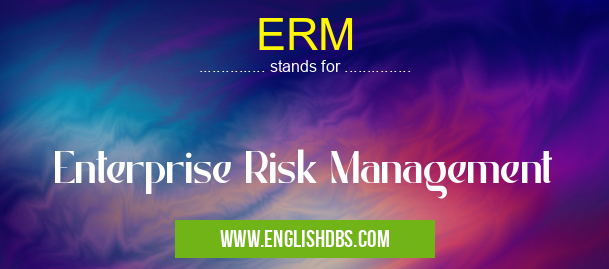What does ERM mean in GENERAL
Enterprise Risk Management (ERM) is a process used by organizations to identify, evaluate and mitigate risks in order to make informed decisions and minimize any potential losses. ERM combines organizational processes, people, data and technology to identify and manage uncertainty that could have an impact on the success of the organization.

ERM meaning in General in Business
ERM mostly used in an acronym General in Category Business that means Enterprise Risk Management
Shorthand: ERM,
Full Form: Enterprise Risk Management
For more information of "Enterprise Risk Management", see the section below.
Essential Questions and Answers on Enterprise Risk Management in "BUSINESS»GENERALBUS"
What is Enterprise Risk Management?
Enterprise Risk Management (ERM) is a process used by organizations to identify, evaluate and mitigate risks in order to make informed decisions and minimize any potential losses.
How does ERM work?
ERM combines organizational processes, people, data and technology to identify and manage uncertainty that could have an impact on the success of the organization. This includes analyzing potential threats or opportunities that may arise from internal or external sources and developing strategies for mitigating risks or seizing potential opportunities.
Are there different types of risk?
Yes, there are different types of risk such as strategic risk, compliance risk, operational risk, financial risk and more. Each type of risk needs to be managed differently depending on the industry context.
How can ERM help companies?
Companies can use ERM to gain insights into their current risk environment and proactively manage those risks in order to protect their reputation, investment portfolio or competitive advantage. It also helps companies develop strategies for responding swiftly should unexpected events occur.
What factors should be taken into account when implementing ERM?
When implementing an ERM program it's important to consider factors such as organizational culture, corporate governance structure, industry regulations, available resources (people/budget) etc. A thorough evaluation of these factors will help ensure long-term success of the program.
Final Words:
The ability for organizations to successfully handle risks is fundamental for growth and sustainability; having an effective ERM system can greatly benefit any business by creating a systematic approach for managing threats while seizing any missed opportunities that might arise.
